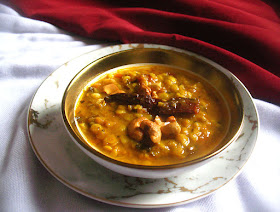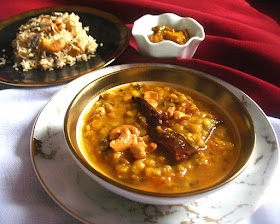I've been cooking Indian creations for years. My interests in Indian food happily coincided with my transition to a vegetarian diet many years ago. As the main staple of a vegetarian Indian diet are legumes, protein is hardly a concern. Continued research and experience has opened up a whole new culinary world to me that was closed until I became a young adult and began to discover and refine my palate.
My earliest introduction to Indian cooking came from books and research, and over the years I've learned dishes that are popular in various regions in India. In addition to books, the internet has since also become an invaluable resource, and I've learned a great number of techniques and variations on themes from trusted websites and established Indian cooks.
I also love to explore, and each dish I make is influenced by what I want to taste and what I have learned goes well together, the ingredients, flavors and textures that best complement one another and work together as an adhesive whole. Spices are the key to my cooking, and that does not mean a dish has to be fiery hot either. What I find more distinctive about Indian cuisine is the range of different techniques and the complex textures and tastes in addition to the relatively simplicity and easy preparation of so many dishes that I served over the years.
Many of the dishes that I have been enjoying in particular are influenced from the western state of Gujarat. Most Gujarati recipes have a complex taste, with a subtle spicy and delicate balance of sweet and sour flavors. Tamarind is often used for the sour element, though lemon juice is an option, and for sweetness, jaggery is most often used though I have found coconut sugar works quite well too. This particular version is also onion and garlic free.
Khatti (tangy or sour) meethi (sweet) dal is an ideal dish for those who are partial to a myriad of complexity of flavors and textures. Made with toor dal, the liquid component can easily be adjusted to achieve a thicker or thinner consistency to suit your preferences. Gujarati dal is usually rather soupy, but if you want a thicker version that is absolutely fine too and in this case, my decided choice.
Serve with basmati rice and / or your favorite Indian flat breads such as roti or naan for a complete and satisfying meal. I served the dal alongside a quick version of mushroom pulao with tamarind and a side of hot and sour Indian pickles. If I had more time, I would have gladly made some flat breads to complement my meal even further.
 Gujarati Dal (Khatti Meethi Dal ) Gujarati Dal (Khatti Meethi Dal ) |
| Recipe by Lisa Turner Cuisine: Indian Published on January 21, 2019 Flavorful and fragrant Gujarati Indian dal curry with sweet, sour and spicy flavors  Print this recipe Print this recipeDal:
|
Other dal dishes to enjoy from Lisa's Kitchen:
Urad Dal with Toor Dal and Spinach and Parsley
Madras-Style Red Lentil Soup
Spicy Urad Dal with Tomato and Fennel Seeds
Spicy Yellow Lentil Tomato Soup
Tarka Dal With Tomato and Spices




Hi, I have tamarind paste in my kitchen, how much would I use to substitute the lemon juice for in this recipe? Excited to try this creation soon. thank you.
ReplyDeleteThanks for dropping by my site. I would use 1 tablespoon of tamarind paste in place of the lemon juice.
ReplyDelete